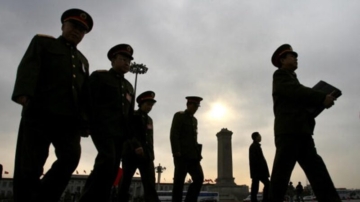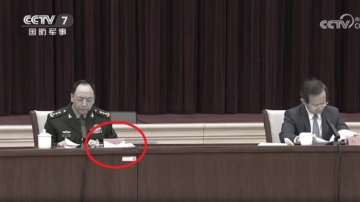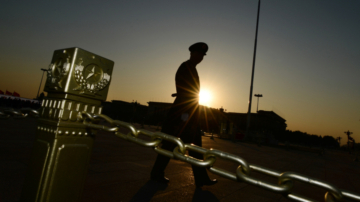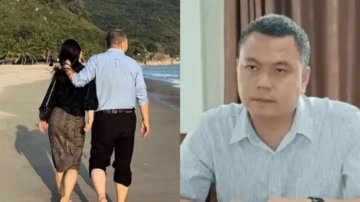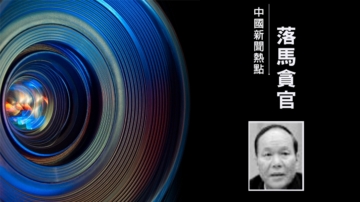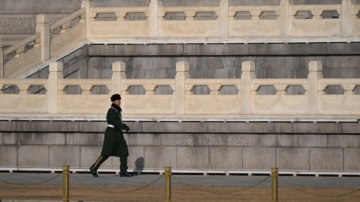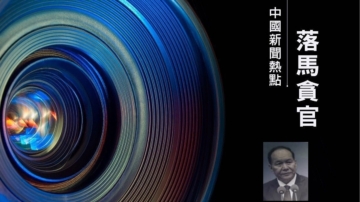【新唐人2013年09月20日訊】近來,中共喉舌媒體一邊批判憲政,一邊追查「網路謠言」,封殺輿論,不斷加緊對意識形態的控制。但是,日本媒體以《中央黨校的叛亂》為題,認為中共中央黨校最近發出的擁護憲政和支援網路輿論的聲音,顯示了中共意識形態主幹出現了「中樞神經分裂」。請看報導。
日本《產經新聞》9月12號發表專欄作家、知名評論家石平的文章指出,中央黨校女教授蔡霞發表的「憲政民主才能使中國長治久安」演講,並且被民間《共識網》刊載,這是前所未有的動向。
蔡霞在講演中指出,目前中國危機重重,比如,社會危險的暴力趨向越來越嚴重;司法沒有公信力;全社會任何人都沒有安全感等問題,只有實施憲政才能解套。
石平表示,作為培養中共高幹的中央黨校對抗喉舌《新華社》、《人民日報》、《解放軍報》,發出擁護憲政的聲音,對當局扼殺網路輿論的行動進行批判,標誌著中共重要的意識形態主幹發生了「中樞神經分裂」。
英國《BBC中文網》記者12號在中央黨校的刊物《學習時報》網頁上,也發現了署名李勇的《憲政體制中的檢查權》等擁護憲政的文章。
原香港《大公報》新聞部主任朱健國指出,反憲政是違犯憲法的,但「搞憲政」是中共拉攏人心的有效口號。
政論專欄作家朱建國:「從中共早期革命鬥爭起,就是為了建立憲政,毛澤東的聯合政府就是搞憲政。當時就是因為國民黨不憲政、不民主,中共要來搞憲政、搞民主,當時不是要跟他們搞聯合政府嗎?」
朱健國表示,此前的中共執政者,誰都不敢公開「反憲政」,因為等於是挖自己的牆角。
時事評論員華頗表卻認為,中共體制內反憲也好保憲也好,不過是左右兩派為了「救黨」開出的不同藥方。
《人民日報》自8月5號起連續三天刊登批判憲政的文章,掀起批判憲政運動;到9月4號《新華社》又刊登社長的文章,誓言「旗幟鮮明地進行輿論鬥爭」;《解放軍報》同一天也出現「奪取網路輿論鬥爭的主導權」的文章,《產經新聞》的文章認為,這是黨軍的兩個喉舌一起向網路輿論發出宣戰。
不僅如此,自8月20號以來,當局在各地開展了打擊網路謠言的行動:河南批捕131人,山西刑拘49人、治安處罰29人、批捕23人,陝西批捕22人。
安徽碭山的一名網民,將一起車禍死亡人數10人錯誤發佈為16人,被處行政拘留5天。
有外媒此前統計說,中國各地加起來被抓捕的人數已經接近一千人。
時事評論員華頗:「沒有習近平的首肯,不可能中共的宣傳系統和政法系統聯手搞了這個大規模的清理網路行動。但是怎樣搞,搞到甚麼程度,在這一點上,中共內部是有分歧的。」
華頗指出,由於網路反腐的興起,中共各級官員對網路是深惡痛絕,目前有了藉口後開始亂抓人,搞得人心惶惶。
朱健國:「按著孫中山的話說,『世界潮流浩浩蕩蕩,順之者昌、逆之者亡』想開歷史倒車,想反憲政的,必然失敗的,那是肯定的。」
9月2號,《學習時報》刊登了黨校教授宋惠昌的評論文章,以西周時期的厲王封殺民眾聲音,導致自己倉皇出逃的結果,來論說不應扼殺網路輿論的觀點。宋惠昌說,任何時代如果想以權封殺民眾的口都是重大錯誤,就算一時成功,最終也會被民眾拉下權力的寶座。
《產經新聞》也指出,中央黨校的叛亂也反映了習近平政權制約黨內的失敗和中共思想、理念方面已經陷入的混亂。
華頗認為,目前中共執政集團內部各派別矛盾激化、中共與民眾之間矛盾激化,「鄧派」、「毛派」、「自由派」也在意識形態上鬥爭不斷,反映了中共危機的加深。
採訪/陳漢 編輯/宋風 後製/王明宇
Japan Media: CCP Party School Rebels Against Party Media
Chinese Communist Party (CCP) mouthpiece media have been
criticizing the concept of constitutional government,
tracking down "Internet Rumors," suppressing public opinion
and tightening up ideological control without letup.
However, a report by Japanese media titled,
The CCP Party School's Rebellion,
says that the CCP Party School's recently voicing support
for constitutional government and online opinion suggests that
the main stem of the CCP's ideology has started to split.
On September 12, Japan's Sankei Shimbun published a column
written by well-known commentator Shi Ping.
He says it is unprecedented that CCP Party School professor
Cai Xia gave a speech titled, Only Constitutional Democracy
Can Lead China To Long-Term Stability and Peace,
which was later published by 21ccom.net, a Chinese news site.
Cai Xia said in her speech that China is in serious crisis.
The issue of social violence is getting more and more serious.
The judiciary system lacks credibility.
No one in the society has a sense of security.
Only the implementation of constitutional government
can resolve the issue.
Shi Ping says that as the training camp for senior CCP officials,
the CCP Central Party School's voice against CCP mouthpieces
Xinhua News Agency, the People's Daily, and PLA Daily,
its support to constitutional government and
its criticism of the authorities' suppression of internet speech,
signifies that the backbone of CCP's ideology is splitting.
On September 12, a reporter for BBC Chinese also found
articles supporting constitutional government
on the CCP Party School publication website Study Times.
One article titled, Inspection Rights of Constitutional System
was written by Li Yong.
Zhu Jianguo, former news director at HK based Ta Kung Pao,
says opposing constitutional government violates the law.
The CCP's "Engaging in Constitutionalism" is just it using
words as an effective slogan of the CCP to win people over.
Political commentator and columnist Zhu Jianguo:
"Since the start of it's revolutions the CCP has used
the slogan of establishing a constitutional government.
At that time, the KMT government did not have a
constitutional and democratic government.
The CCP led the fight to engage in a coalition government
based on a constitution and democracy."
Zhu Jianguo says that no previous CCP leaders
dared to publicly expresses "Anti-Constitutional" sentiments,
as they would damage their own foundation.
Commentator Hua Po says, however,
that whether the CCP supports constitutionalism or opposes it,
both are just the recipes of different factions to 'save the CCP.'
From August 5, The People's Daily published articles
criticizing constitutionalism for three days in a row,
launching the "Anti-Constitutionalism" campaign .
On September 5, Xinhua News Agency published
its president's article, promising to "Have A Clear Stand
in Carrying out Fighting on Public Opinions."
PLA Daily also published an article on the same day,
titled "To Fight with Online Opinions for Control."
Sankei Shimbun's article points out these two mouthpieces
are together declaring war with online opinions.
Moreover, since August 20, the authorities have been
carrying out actions to attack "online rumors."
Henan Province saw 131 people arrested; in Shanxi Province,
49 people were detained, 29 were punished, and 23 arrested;
and Shanxi Province saw 22 people arrested.
When 10 people died in a traffic accident in Dangshan, Anhui
Province, a netizen mistakenly posted online that 16 died.
He was then detained for five days.
Some overseas media provided data that nearly 1,000 people
have been arrested across China.
Commentator Hua Po:"Without Xi Jinping's approval,
it would not be possible for CCP's propaganda system
and its Political and Legal System to jointly engage in these
large-scale clean-up operations.
But there are still disagreements regarding
how to carry it out and to what extent it should be carried out."
Huo Po says that the rise of anti-corruption opinions online
is hated by CCP officials.
Now they have excuse an to arrest people,
making people anxious.
Zhu Jianguo: "According to Sun Yat-sen's statement:
'The trend of the world is so mighty,
those who follow it will prosper, those who oppose it perish.'
Those who are against the trend of history and
are anti-constitutional are doomed to failure. That is for sure."
On September 2, Study Times published a review article
written by Song Huichang, a CCP Party School professor.
The article used the example of King Li suppressing
the voice of the people in the Western Zhou Dynasty to
illustrate that authorities should not suppress online voices.
Song Huichang said that in any era, suppression of speech
is a huge mistake. There might be a short-term victory.
But those in power will eventually be taken down
from their throne by the people."
Sankei Shimbun says the CCP Party School's rebellion
reflects that Xi Jinping's control of the CCP fractions
is a failure and that the CCP ideology is in a mess.
Hua Po says there are intense conflicts among
various CCP factions and between the CCP and the people.
Deng Xiaoping's faction, Mao Zedong's fraction and
the liberal faction also battle over ideology,
reflecting that the CCP's crisis is deepening.
NTD Reporter Chen Han and Song Feng
日本《產經新聞》9月12號發表專欄作家、知名評論家石平的文章指出,中央黨校女教授蔡霞發表的「憲政民主才能使中國長治久安」演講,並且被民間《共識網》刊載,這是前所未有的動向。
蔡霞在講演中指出,目前中國危機重重,比如,社會危險的暴力趨向越來越嚴重;司法沒有公信力;全社會任何人都沒有安全感等問題,只有實施憲政才能解套。
石平表示,作為培養中共高幹的中央黨校對抗喉舌《新華社》、《人民日報》、《解放軍報》,發出擁護憲政的聲音,對當局扼殺網路輿論的行動進行批判,標誌著中共重要的意識形態主幹發生了「中樞神經分裂」。
英國《BBC中文網》記者12號在中央黨校的刊物《學習時報》網頁上,也發現了署名李勇的《憲政體制中的檢查權》等擁護憲政的文章。
原香港《大公報》新聞部主任朱健國指出,反憲政是違犯憲法的,但「搞憲政」是中共拉攏人心的有效口號。
政論專欄作家朱建國:「從中共早期革命鬥爭起,就是為了建立憲政,毛澤東的聯合政府就是搞憲政。當時就是因為國民黨不憲政、不民主,中共要來搞憲政、搞民主,當時不是要跟他們搞聯合政府嗎?」
朱健國表示,此前的中共執政者,誰都不敢公開「反憲政」,因為等於是挖自己的牆角。
時事評論員華頗表卻認為,中共體制內反憲也好保憲也好,不過是左右兩派為了「救黨」開出的不同藥方。
《人民日報》自8月5號起連續三天刊登批判憲政的文章,掀起批判憲政運動;到9月4號《新華社》又刊登社長的文章,誓言「旗幟鮮明地進行輿論鬥爭」;《解放軍報》同一天也出現「奪取網路輿論鬥爭的主導權」的文章,《產經新聞》的文章認為,這是黨軍的兩個喉舌一起向網路輿論發出宣戰。
不僅如此,自8月20號以來,當局在各地開展了打擊網路謠言的行動:河南批捕131人,山西刑拘49人、治安處罰29人、批捕23人,陝西批捕22人。
安徽碭山的一名網民,將一起車禍死亡人數10人錯誤發佈為16人,被處行政拘留5天。
有外媒此前統計說,中國各地加起來被抓捕的人數已經接近一千人。
時事評論員華頗:「沒有習近平的首肯,不可能中共的宣傳系統和政法系統聯手搞了這個大規模的清理網路行動。但是怎樣搞,搞到甚麼程度,在這一點上,中共內部是有分歧的。」
華頗指出,由於網路反腐的興起,中共各級官員對網路是深惡痛絕,目前有了藉口後開始亂抓人,搞得人心惶惶。
朱健國:「按著孫中山的話說,『世界潮流浩浩蕩蕩,順之者昌、逆之者亡』想開歷史倒車,想反憲政的,必然失敗的,那是肯定的。」
9月2號,《學習時報》刊登了黨校教授宋惠昌的評論文章,以西周時期的厲王封殺民眾聲音,導致自己倉皇出逃的結果,來論說不應扼殺網路輿論的觀點。宋惠昌說,任何時代如果想以權封殺民眾的口都是重大錯誤,就算一時成功,最終也會被民眾拉下權力的寶座。
《產經新聞》也指出,中央黨校的叛亂也反映了習近平政權制約黨內的失敗和中共思想、理念方面已經陷入的混亂。
華頗認為,目前中共執政集團內部各派別矛盾激化、中共與民眾之間矛盾激化,「鄧派」、「毛派」、「自由派」也在意識形態上鬥爭不斷,反映了中共危機的加深。
採訪/陳漢 編輯/宋風 後製/王明宇
Japan Media: CCP Party School Rebels Against Party Media
Chinese Communist Party (CCP) mouthpiece media have been
criticizing the concept of constitutional government,
tracking down "Internet Rumors," suppressing public opinion
and tightening up ideological control without letup.
However, a report by Japanese media titled,
The CCP Party School's Rebellion,
says that the CCP Party School's recently voicing support
for constitutional government and online opinion suggests that
the main stem of the CCP's ideology has started to split.
On September 12, Japan's Sankei Shimbun published a column
written by well-known commentator Shi Ping.
He says it is unprecedented that CCP Party School professor
Cai Xia gave a speech titled, Only Constitutional Democracy
Can Lead China To Long-Term Stability and Peace,
which was later published by 21ccom.net, a Chinese news site.
Cai Xia said in her speech that China is in serious crisis.
The issue of social violence is getting more and more serious.
The judiciary system lacks credibility.
No one in the society has a sense of security.
Only the implementation of constitutional government
can resolve the issue.
Shi Ping says that as the training camp for senior CCP officials,
the CCP Central Party School's voice against CCP mouthpieces
Xinhua News Agency, the People's Daily, and PLA Daily,
its support to constitutional government and
its criticism of the authorities' suppression of internet speech,
signifies that the backbone of CCP's ideology is splitting.
On September 12, a reporter for BBC Chinese also found
articles supporting constitutional government
on the CCP Party School publication website Study Times.
One article titled, Inspection Rights of Constitutional System
was written by Li Yong.
Zhu Jianguo, former news director at HK based Ta Kung Pao,
says opposing constitutional government violates the law.
The CCP's "Engaging in Constitutionalism" is just it using
words as an effective slogan of the CCP to win people over.
Political commentator and columnist Zhu Jianguo:
"Since the start of it's revolutions the CCP has used
the slogan of establishing a constitutional government.
At that time, the KMT government did not have a
constitutional and democratic government.
The CCP led the fight to engage in a coalition government
based on a constitution and democracy."
Zhu Jianguo says that no previous CCP leaders
dared to publicly expresses "Anti-Constitutional" sentiments,
as they would damage their own foundation.
Commentator Hua Po says, however,
that whether the CCP supports constitutionalism or opposes it,
both are just the recipes of different factions to 'save the CCP.'
From August 5, The People's Daily published articles
criticizing constitutionalism for three days in a row,
launching the "Anti-Constitutionalism" campaign .
On September 5, Xinhua News Agency published
its president's article, promising to "Have A Clear Stand
in Carrying out Fighting on Public Opinions."
PLA Daily also published an article on the same day,
titled "To Fight with Online Opinions for Control."
Sankei Shimbun's article points out these two mouthpieces
are together declaring war with online opinions.
Moreover, since August 20, the authorities have been
carrying out actions to attack "online rumors."
Henan Province saw 131 people arrested; in Shanxi Province,
49 people were detained, 29 were punished, and 23 arrested;
and Shanxi Province saw 22 people arrested.
When 10 people died in a traffic accident in Dangshan, Anhui
Province, a netizen mistakenly posted online that 16 died.
He was then detained for five days.
Some overseas media provided data that nearly 1,000 people
have been arrested across China.
Commentator Hua Po:"Without Xi Jinping's approval,
it would not be possible for CCP's propaganda system
and its Political and Legal System to jointly engage in these
large-scale clean-up operations.
But there are still disagreements regarding
how to carry it out and to what extent it should be carried out."
Huo Po says that the rise of anti-corruption opinions online
is hated by CCP officials.
Now they have excuse an to arrest people,
making people anxious.
Zhu Jianguo: "According to Sun Yat-sen's statement:
'The trend of the world is so mighty,
those who follow it will prosper, those who oppose it perish.'
Those who are against the trend of history and
are anti-constitutional are doomed to failure. That is for sure."
On September 2, Study Times published a review article
written by Song Huichang, a CCP Party School professor.
The article used the example of King Li suppressing
the voice of the people in the Western Zhou Dynasty to
illustrate that authorities should not suppress online voices.
Song Huichang said that in any era, suppression of speech
is a huge mistake. There might be a short-term victory.
But those in power will eventually be taken down
from their throne by the people."
Sankei Shimbun says the CCP Party School's rebellion
reflects that Xi Jinping's control of the CCP fractions
is a failure and that the CCP ideology is in a mess.
Hua Po says there are intense conflicts among
various CCP factions and between the CCP and the people.
Deng Xiaoping's faction, Mao Zedong's fraction and
the liberal faction also battle over ideology,
reflecting that the CCP's crisis is deepening.
NTD Reporter Chen Han and Song Feng

